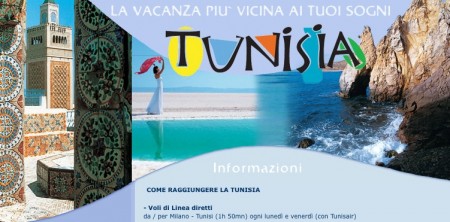When in Milan last week, my eyes were seduced by big posters showing picturesque coastlines and romantic sceneries with ruins of antique temples in the foreground. Pure beauty, a pleasure for the eyes and the traveller in me craving. „Tunisia“ it said on the posters, „la vacanza piu’ vicina ai tuoi sogni“ – the holidays closest to your dreams.

My emotions still captured by the beautiful images, I started to realize that these were the work of the Tunisian tourist industry, which was running a big scale advertisement campaign in the Metropolitana, the Milanese underground. But not only there: On a piazza close to Milan’s famous Duomo Tunisia Turismo had built a tent where it presented the destination with music, food and folklore.
Whereas the latter seemed corny and did not appeal to me the posters did. But there was one problem. The beautiful images clashed in my head with the notion of Tunisia being a country where civil liberties have been restricted and where government censorship and self-censorship has infected the society. Over the last decade or so, Tunisia has become an autocratic regime under the rule of the president with the poetic name Zine el-Abidine Ben Ali.
Nevertheless, in times when the Italian people seem to be hit hard by the economic crisis, the advertisers have a very good argument: “Tunisia, un Paese vicino, dall’atmosfera esotica”. Even though Tunisia is very close to Italy (read inexpensive to visit), it is an exotic place.
However, Italians are not alone in being hit by the financial crisis. Back home, my suspicions concerning the state of Tunisian politics and society were confirmed. Listening to the radio, I heard an interview with Irene Khan, secretary-general of Amnesty International. She talked about the effects of the global financial crisis on the human rights situation, which she described as deteriorating.
As an example, she mentioned Tunisia, where “strikes and protests were put down with force, causing two deaths, many injuries and more than 2,000 prosecutions of alleged organizers, some culminating in long prison sentences”.
YouTube video showing Tunisian police forces throwing stones at rioters in Redeyef
Although the protests and riots in the Gafsa mining basin have deeper roots, they seem to be another example of a “credit crunch riot”, as analyzed by James Boot in the ISN Special Report “Financial Meltdown, Social Breakdown”.
By means of censorship the Tunisian government takes care that news such as these on the crack-down of protests in Redeyef do not find an audience. This is important if Tunisia wants to keep its reputation as a relatively progressive country. Also, this kind of news does go not well with such beautiful images as shown in Milan.
Censorship in Tunisia is ironic given the fact that the country was host of the 2005 World Summit on the Information Society. However, there is something more ironic than that.
While the tourist industry portraits Tunisia as a destination close to Italian dreams, thousands of Tunisians are arriving on the southern Italian island of Lampedusa, with the hope of fulfilling their dreams of a better life in Europe. It seems many of these young emigrants come from the poor Gafsa region.
European tourists flocking to Tunisia, Tunisian emigrants flocking to Europe, both groups with the same goal of finding the paradise on earth – is that the irony of globalization? I don’t know about you, but I don’t feel like spending my next holidays in Tunisia anymore.

